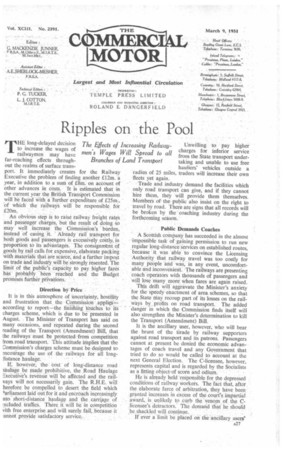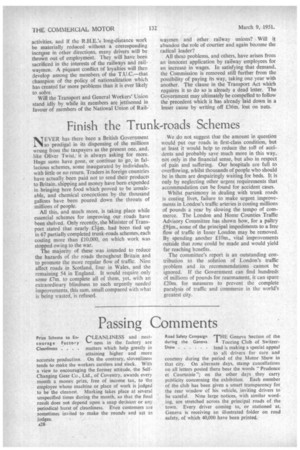Ripples on the Pool
Page 29

Page 30

If you've noticed an error in this article please click here to report it so we can fix it.
The Effects of increasing Railwaymen's Wages Will Spread to all Branches of Land Transport THE long-delayed decision to increase the wages of railwaymen may have far-reaching effects throughout the realms of surface transport. It immediately creates for the Railway Executive the problem of finding another £12m. 'a year, in addition to a sum of am. on account of other advances in costs. 'It is estimated that in the current year the British Transport Commission will be faced With a -further expenditure of £25m., of which the railways will be responsible for £20m.
• An obvious step is to raise railway freight rates and passenger charges, but the result of doing So may well increase the Commission's burden, instead of easing it Already fail transport for both goods and passengers is excessively .cdstly, in proportion to its athiantages. The consignm'ent of goods by rail calls for expensive, elaborate packing with Materials that are scarce, and a further impost on trade and industry Will be strongly resented. The limit of the public's -capacity to pay higher fares has probably been reached and the Budget promises further privations.'
Direction by Price It is in this atmosphere of uncertainty, hostility and frustration that the Commission applies-according to report—the finishing 'touches to its charges scheme, which is due to be presented in August. The Minister of Transport has said on many occasions, and repeated during the second reading of the Transport (Amendment) Bill, that the railways must be protected from competition Erom road transport. This attitude implies that the rJornmission's charges scheme must be designed to !moulage the use of the railways for all longlistance haulage. If, however, the Cost of lon&istance road iaulage be made prohibitive, the Road Haulage ExeCutiVe's revenue will be affected and the railvays will not necessarily gain. The R.H.E. will herefore be compelled to desert the field which 'arliament laid out for it and encroach increasingly no short-distance haulage and the carriage of :xcluded traffics. There it will be in competition vith free enterprise and will surely fail; because it aimot provide satisfactory service. Unwilling to pay higher charges for inferior service from the State transport undertaking and unable to use free hauliers' vehicles outside a traders will increase their own 'radius of 25 miles, 'fleets yet again.
Trade and industry demand the facilities which only road transport can give, and if they cannot "hire them, they 'will provide them themselves. -Members of the public also insist on the right to travel by road. There are signs that all records will be broken by the 'coaching industry during the 'forthcoming season.
Public Demands Coaches A Scottish company has succeeded in the almost -impossible task of gaining permission to run new regular long-distance'Services on established routes, 'because it was 'able to convince the Licensing 'Authority.. .that railway travel was too costly for many People 'and was, in any event, uncomfortable and inconvenient. -The railways are presenting coach operators with thousands of passengers and will lose many niore. when fares are again raised. This drift will aggravate the Minister's anxiety for the speedy -enactment of area schemes, so that the State May recoup part of its losses on the railways by: profits on road transport. The added 'danger in which the Commission finds itself will also strengthen the Minister's determination to kill the Transport (Amendment) Bill.
It is the ancillary user, however, who will bear the brunt of the tirade by railway supporters against road transport and its patrons. .Passengers cannot at present be denied the economic advantages of coach travel and any Government that tried to do so would be called to account at the next General Election. The C-licensee, however, represents capital and is regarded by the Socialists as a fitting object-of scorn and odium. • He is already held 'responsible for the depressed conditions of railway workers. The fact that, after the elaborate farce of arbitration, they have been granted increases in excess of the court's impartial award,, is unlikely to .curb the venom of the Clicensee's detractors. The demand that he should be, shackled will Continue.
N If ever a Placed on the ancillary users' activities, and if the R.H.E.'s long-distance work be materially reduced without a corresponding incredase in other directions, many drivers will be thrown out of employment. They will have been sacrificed in the interests of the railways and railwaymen. A piquant conflict of loyalties will then develop among the members of the T.U.C.—that champion of the policy of nationalization which has created far more problems than it is ever likely to solve.
Will the Transport and General Workers' Union stand idly by while its members are jettisoned in favour of members of the National Union of Rail waymen and other railway unions? Will it abandon the role of courtier and again become the radical leader?
All these problems, and others, have arisen from an innocent application by railway employees for an increase in wages. In satisfying that demand, the Commission is removed still further from the possibility of paying its way, taking one year with another. The clause in the Transport Act which requires it to do so is already a dead letter. The Government may ultimately be compelled to follow the precedent which it has already laid down in a lesser cause by writing off £36m. lost on nuts.




















































































